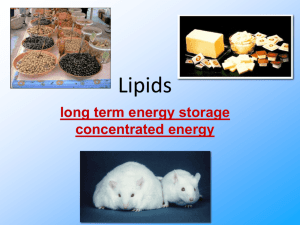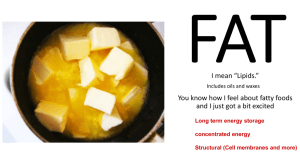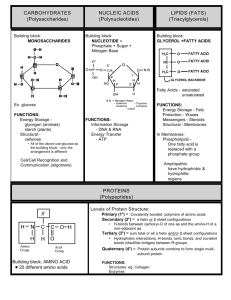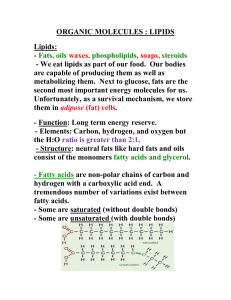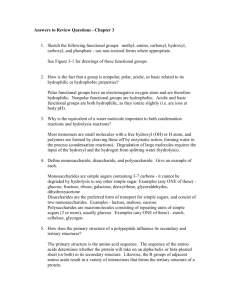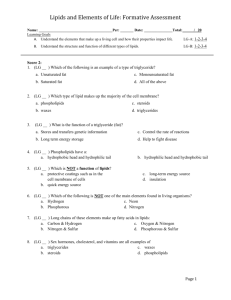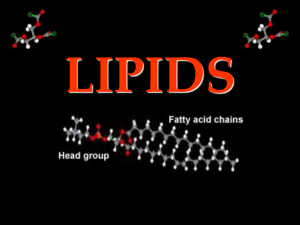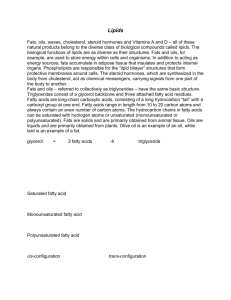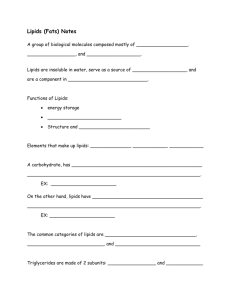Lipids long term energy storage concentrated energy Adapted from Kim
advertisement
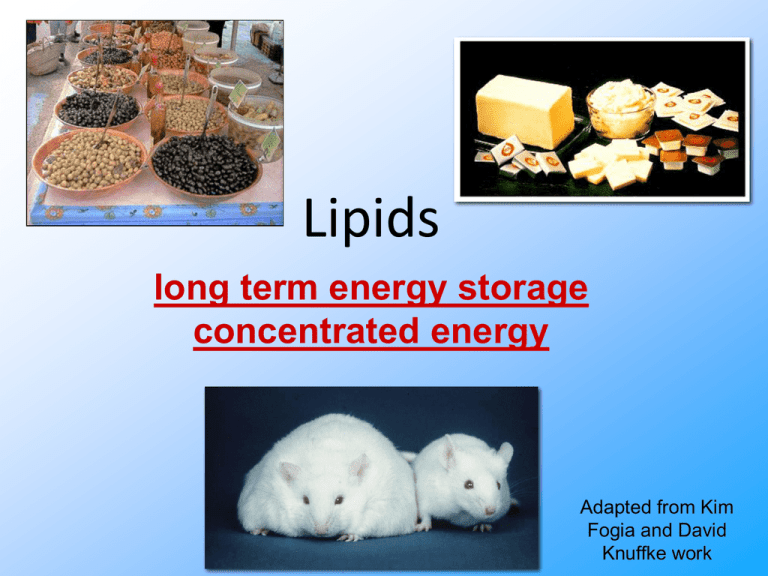
Lipids long term energy storage concentrated energy Adapted from Kim Fogia and David Knuffke work Lipids • Lipids are composed of C, H, O – long hydrocarbon chains (H-C) • “Family groups” – fats – phospholipids – steroids • Do not form polymers – big molecules made of smaller subunits – not a continuing chain Fats • Structure: – glycerol (3C alcohol) + fatty acid • fatty acid = long HC “tail” with carboxyl (COOH) group “head” enzyme H2O dehydration synthesis Building Fats • Triacylglycerol (triglycerides) – 3 fatty acids linked to glycerol – ester linkage = between OH & COOH hydroxyl carboxyl Dehydration synthesis H2O dehydration synthesis enzyme H2O enzyme H2O enzyme HO Fats store energy • Long HC chain – polar or non-polar? – hydrophilic or hydrophobic? • Function: – energy storage • concentrated – all H-C! – cushion organs – insulates body • think whale blubber! Saturated fats • All C bonded to H • No C=C double bonds – long, straight chain – most animal fats – solid at room temp. • contributes to cardiovascular disease (atherosclerosis) = plaque deposits Unsaturated fats • C=C double bonds in the fatty acids – plant & fish fats – vegetable oils – liquid at room temperature • the kinks made by double bonded C prevent the molecules from packing tightly together Saturated vs. unsaturated saturated unsaturated Phospholipids • Structure: – glycerol + 2 fatty acids + PO4 • PO4 = negatively charged Phospholipids • Hydrophobic or hydrophilic? hydrophobic – fatty acid tails = hydrophillic – PO4 head = “attracted to water” – split “personality” – Amphipathic: contain both hydrophilic and hydrophobic elements “repelled by water” Phospholipids in water • Hydrophilic heads “attracted” to H2O • Hydrophobic tails “hide” from H2O – can self-assemble into “bubbles” Lipid micelle • can also form a phospholipid bilayer • Micelles- hydrophilic heads of phospholipids face H2O and tails are forced together water bilayer water Why is this important? • Phospholipids create a barrier in water – define outside vs. inside – they make cell membranes! Steroids • Structure: – 4 fused C rings + ?? • different steroids created by attaching different functional groups to rings • different structure creates different function – examples: cholesterol, sex hormones cholesterol Cholesterol • Important cell component – animal cell membranes – precursor of all other steroids • including vertebrate sex hormones – high levels in blood may contribute to cardiovascular disease Cholesterol Important component of cell membrane helps keep cell membranes fluid & flexible From Cholesterol Sex Hormones • What a big difference a few atoms can make! Review Questions 1. Lipid molecule hydrolysis produces A. Glycerol and fatty acids B. Glycerol and water C. Water and amino acids D. Glucose and fatty acids E. Water and fatty acids 2. In phospholipids, at least one fatty acid chain is “kinked”, resulting in a bent structure. This phenomenon, which gives fluidity to cell membranes, is caused by A. Excess hydrogen atoms around the bond B. Hydrophobic interactions C. Multiple double bonds D. Sulfhydryl group interactions E. Multiple ionic bonds 3. The single structural unit common to all lipids is A. Fat B. Glycogen C. Cholesterol D. Glycerol E. Carbon
